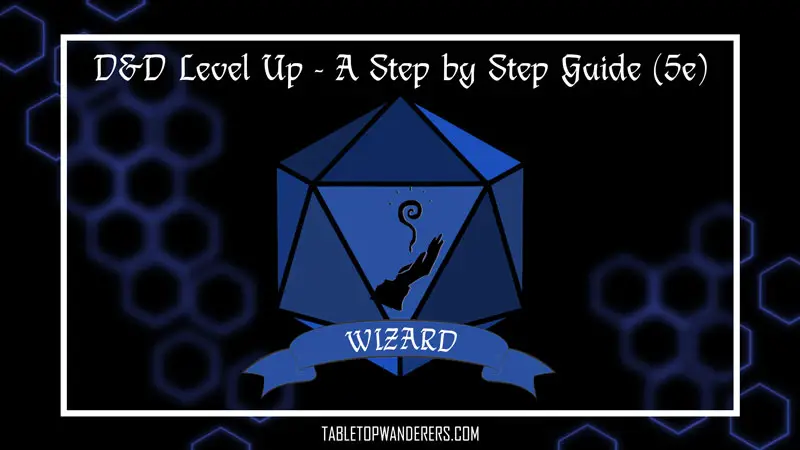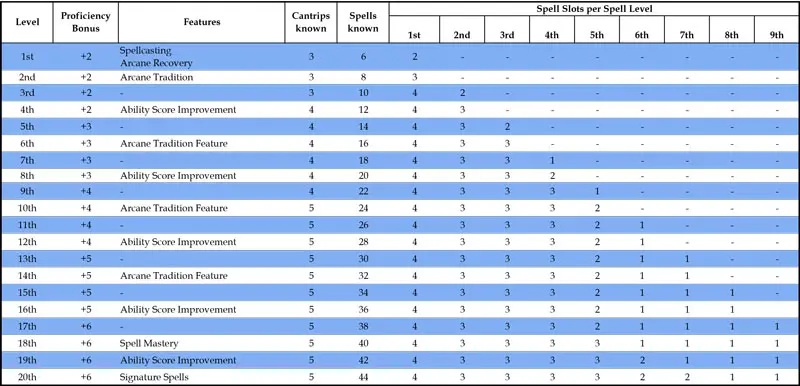This post was last updated on February 2nd, 2023

I always found the level-up process to be one of the most enjoyable and rewarding nuances of any RPG, including Dungeons & Dragons.
It’s the feeling of seeing your character finally getting stronger after you spent so many hours slaying ferocious beasts, exploring dark dungeons, making new acquaintances, escaping from situations you couldn’t handle at your previous level, opening treasure chests filled with coins and jewels (and sometimes empty ones), and so on, that makes this part of the game so exciting.
When it comes to progress through levels in D&D there are quite a few things to remember and all the information you need are scattered on different pages of the Player’s Handbook (and sometimes on other manuals).
I’m pretty sure most of the players have already memorized all the pages they need to look at to level up their alter-ego, but for all the new players, for my friends that constantly ask me what to do when they have to level up and even for veterans who just want a tidy recap, I thought it would be handy to have a step by step guide to follow that will hopefully make the whole level-up process faster.
In this article, I’ll dive deep into the D&D Wizard level up process, and in particular what new abilities and feats you’d unlock, as well as any change of the character’s stats.
This post may contain affiliate links. If you click through and make a purchase, I will get a commission at no extra cost to you. See our Affiliate Disclosure.
D&D Wizard Level Up Advancement Table
Here’s a quick overview of the Wizard level up advancement if you want to get a sneak peek or if you need a quick recap.
Keep scrolling for a deeper description of each level.

1st Level – Wizard Starting Features & Abilities
Hit Points
- Basic Hit Points: 6 + Constitution (CON) modifier.
- Hit Dice: 1d6.
Proficiencies
- Armour: None.
- Weapons: Daggers, darts, slings, quarterstaff and light crossbows.
- Tools: None.
- Proficiency bonus: +2.
- Saving Throws: Intelligence (INT) and Wisdom (WIS).
- Skills: Choose two skills from Arcana, History, Insight, Investigation, Medicine, and Religion.
Class Features
- Spellcasting
Thanks to being a student of arcane magic you know how to cast the spells that are contained in your spellbook. At level 1 you have the following:
Cantrips known: 3.
Spells known: 6.
Spell slots: 2 (1st level). - Arcane Recovery
Once per day, after you finish a short rest, you can choose which spell slots you want to recover based on your level.
2nd Level
- Hit Points: add 1d6 (roll or 4) + Constitution (CON) modifier to the current hit points.
- Hit Dice: one additional d6.
- Spells known: +2.
- Spell slots: +1 (1st level).
- Arcane Tradition
You can choose to follow an arcane tradition that will help shape your magic through one of the different schools in the game: school of Abjuration, school of Conjuration, school of Divination, school of Enchantment, school of Evocation, school of Illusion, school of Necromancy, school of Transmutation, Bladesinging, Chronurgy, Graviturgy, Order of Scribes and War Magic. - New Arcane Tradition subclass feature: this depends on which Arcane Tradition you have chosen for your Wizard.
3rd Level
- Hit Points: add 1d6 (roll or 4) + Constitution (CON) modifier to the current hit points.
- Hit Dice: one additional d6.
- Spells known: +2.
- Spell slots: +1 (1st level), +2 (2nd level).
4th Level
- Hit Points: add 1d6 (roll or 4) + Constitution (CON) modifier to the current hit points.
- Hit Dice: one additional d6.
- Cantrips known: +1.
- Spells known: +2.
- Spell slots: +1 (2nd level).
- Ability Score Improvement: you can increase one ability score by 2 or increase two ability scores by 1. If you use the optional feats rule you can instead choose a Feat of your choice.
5th Level
- Hit Points: add 1d6 (roll or 4) + Constitution (CON) modifier to the current hit points.
- Hit Dice: one additional d6.
- Proficiency Bonus: +1.
- Spells known: +2.
- Spell slots: +2 (3rd level).
6th Level
- Hit Points: add 1d6 (roll or 4) + Constitution (CON) modifier to the current hit points.
- Hit Dice: one additional d6.
- Spells known: +2.
- Spell slots: +1 (3rd level).
- New Arcane Tradition subclass feature: this depends on which Arcane Tradition you have chosen for your Wizard.
7th Level
- Hit Points: add 1d6 (roll or 4) + Constitution (CON) modifier to the current hit points.
- Hit Dice: one additional d6.
- Spells known: +2.
- Spell slots: +1 (4th level).
8th Level
- Hit Points: add 1d6 (roll or 4) + Constitution (CON) modifier to the current hit points.
- Hit Dice: one additional d6.
- Spells known: +2.
- Spell slots: +1 (4th level).
- Ability Score Improvement: you can increase one ability score by 2 or increase two ability scores by 1. If you use the optional feats rule you can instead choose a Feat of your choice.
9th Level
- Hit Points: add 1d6 (roll or 4) + Constitution (CON) modifier to the current hit points.
- Hit Dice: one additional d6.
- Proficiency Bonus: +1.
- Spells known: +2.
- Spell slots: +1 (4th level), +1 (5th level).
10th Level
- Hit Points: add 1d6 (roll or 4) + Constitution (CON) modifier to the current hit points.
- Hit Dice: one additional d6.
- Cantrips known: +1.
- Spells known: +2.
- Spell slots: +1 (5th level).
- New Arcane Tradition subclass feature: this depends on which Arcane Tradition you have chosen for your Wizard.
11th Level
- Hit Points: add 1d6 (roll or 4) + Constitution (CON) modifier to the current hit points.
- Hit Dice: one additional d6.
- Spells known: +2.
- Spell slots: +1 (6th level).
12th Level
- Hit Points: add 1d6 (roll or 4) + Constitution (CON) modifier to the current hit points.
- Hit Dice: one additional d6.
- Spells known: +2.
- Ability Score Improvement: you can increase one ability score by 2 or increase two ability scores by 1. If you use the optional feats rule you can instead choose a Feat of your choice.
13th Level
- Hit Points: add 1d6 (roll or 4) + Constitution (CON) modifier to the current hit points.
- Hit Dice: one additional d6.
- Proficiency Bonus: +1.
- Spells known: +2.
- Spell slots: +1 (7th level).
14th Level
- Hit Points: add 1d6 (roll or 4) + Constitution (CON) modifier to the current hit points.
- Hit Dice: one additional d6.
- Spells known: +2.
- New Arcane Tradition subclass feature: this depends on which Arcane Tradition you have chosen for your Wizard.
15th Level
- Hit Points: add 1d6 (roll or 4) + Constitution (CON) modifier to the current hit points.
- Hit Dice: one additional d6.
- Spells known: +2.
- Spell slots: +1 (8th level).
16th Level
- Hit Points: add 1d6 (roll or 4) + Constitution (CON) modifier to the current hit points.
- Hit Dice: one additional d6.
- Spells known: +2.
- Ability Score Improvement: you can increase one ability score by 2 or increase two ability scores by 1. If you use the optional feats rule you can instead choose a Feat of your choice.
17th Level
- Hit Points: add 1d6 (roll or 4) + Constitution (CON) modifier to the current hit points.
- Hit Dice: one additional d6.
- Proficiency Bonus: +1.
- Spells known: +2.
- Spell slots: +1 (9th level).
18th Level
- Hit Points: add 1d6 (roll or 4) + Constitution (CON) modifier to the current hit points.
- Hit Dice: one additional d6.
- Spells known: +2.
- Spell slots: +1 (5th level).
- Spell Mastery
You can choose a 1st-level spell and a 2nd-level spell from your spellbook that can be cast at their lowest level without expending any spell slot.
19th Level
- Hit Points: add 1d6 (roll or 4) + Constitution (CON) modifier to the current hit points.
- Hit Dice: one additional d6.
- Spells known: +2.
- Spell slots: +1 (6th level).
- Ability Score Improvement: you can increase one ability score by 2 or increase two ability scores by 1. If you use the optional feats rule you can instead choose a Feat of your choice.
20th Level
- Hit Points: add 1d6 (roll or 4) + Constitution (CON) modifier to the current hit points.
- Hit Dice: one additional d6.
- Spells known: +2.
- Spell slots: +1 (7th level).
- Signature Spells
You can choose two 3rd-level spells in your spellbook that don’t count against the number of prepared spells and cast each without expending a spell slot. You can do so once every short or long rest.